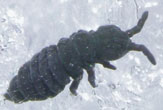Fleas pave the way for organ transplantation techniques
 Snow fleas or tail fleas can live comfortably in frost. A few fleas know how to avoid the winter cold. They secrete an antifreeze, helping the body to freeze. Now, scientists say it is possible to extract the antifreeze to preserve human organs at low temperatures, thereby extending the time of travel and transplantation.
Snow fleas or tail fleas can live comfortably in frost. A few fleas know how to avoid the winter cold. They secrete an antifreeze, helping the body to freeze. Now, scientists say it is possible to extract the antifreeze to preserve human organs at low temperatures, thereby extending the time of travel and transplantation.
" Transplant organs must be kept at a freezing point or a little warmer ," said Laurie Graham of Queen's University in Ontario, Canada. " If we can lower the temperature to the level where the organ is stored safely, the shelf life will be longer ."
Graham's team isolated a special protein from the antifreeze. They said it could also be developed to increase frost resistance in plants, or to refrain from crystallization in frozen foods.
Snow fleas are also known as tails because they can jump hundreds of times higher than their bodies. Graham caught them on the snow slopes in the winter.
T. An ( according to LiveScience )
- What is organ transplantation?
- Vietnam is about to match the face, intestine and uterus
- Things to know about kidney transplants
- Reproduce the organ with a chip
- China tightens management of human organ transplantation
- How to register organ donors when they die?
- Goat sperm transplantation to humans: The past and future of heterosexual transplantation
- America intends to cultivate stem cells in the universe
- The robot can now cultivate human organs quickly
- Can transplant ... kidney and pig heart for humans
- Transplants should be made between people of the same sex
- Dinosaur fleas
 Green tea cleans teeth better than mouthwash?
Green tea cleans teeth better than mouthwash? Death kiss: This is why you should not let anyone kiss your baby's lips
Death kiss: This is why you should not let anyone kiss your baby's lips What is salmonellosis?
What is salmonellosis? Caution should be exercised when using aloe vera through eating and drinking
Caution should be exercised when using aloe vera through eating and drinking